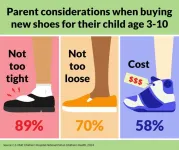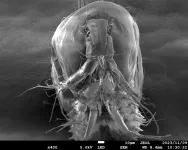Under embargo: Smell of human stress affects dogs’ emotions leading them to make more pessimistic choices
Dogs experience emotional contagion from the smell of human stress.
2024-07-22
(Press-News.org) Peer reviewed: Yes
Type of evidence: Observational study
Subject: Animals
UNDER STRICT EMBARGO until 10:00 hours [UK BST] / 05:00 hours [US EDT] Monday 22 July 2024
Smell of human stress affects dogs’ emotions leading them to make more pessimistic choices
Dogs experience emotional contagion from the smell of human stress, leading them to make more ‘pessimistic’ choices, new research finds. The University of Bristol-led study, published in Scientific Reports today [22 July], is the first to test how human stress odours affect dogs' learning and emotional state.
Evidence in humans suggests that the smell of a stressed person subconsciously affects the emotions and choices made by others around them. Bristol Veterinary School researchers wanted to find out whether dogs also experience changes in their learning and emotional state in response to human stress or relaxation odours.
The team used a test of ‘optimism’ or ‘pessimism’ in animals, which is based on findings that ‘optimistic’ or ‘pessimistic’ choices by people indicate positive or negative emotions, respectively.
The researchers recruited 18 dog-owner partnerships to take part in a series of trials with different human smells present. During the trials, dogs were trained that when a food bowl was placed in one location, it contained a treat, but when placed in another location, it was empty. Once a dog learned the difference between these bowl locations, they were faster to approach the location with a treat than the empty location. Researchers then tested how quickly the dog would approach new, ambiguous bowl locations positioned between the original two.
A quick approach reflected ‘optimism’ about food being present in these ambiguous locations – a marker of a positive emotional state – whilst a slow approach indicated ‘pessimism’ and negative emotion. These trials were repeated whilst each dog was exposed to either no odour or the odours of sweat and breath samples from humans in either a stressed (arithmetic test) or relaxed (listening to soundscapes) state.
Researchers discovered that the stress smell made dogs slower to approach the ambiguous bowl location nearest the trained location of the empty bowl. An effect that was not seen with the relaxed smell. These findings suggest that the stress smell may have increased the dogs’ expectations that this new location contained no food, similar to the nearby empty bowl location.
Researchers suggest this ‘pessimistic’ response reflects a negative emotional state and could possibly be a way for the dog to conserve energy and avoid disappointment.
The team also found that dogs continued to improve their learning about the presence or absence of food in the two trained bowl locations and that they improved faster when the stress smell was present.
Dr Nicola Rooney, Senior Lecturer in Wildlife and Conservation at Bristol Veterinary School and the paper’s lead author explained: “Understanding how human stress affects dogs' wellbeing is an important consideration for dogs in kennels and when training companion dogs and dogs for working roles such as assistance dogs.
“Dog owners know how attuned their pets are to their emotions, but here we show that even the odour of a stressed, unfamiliar human affects a dog’s emotional state, perception of rewards, and ability to learn. Working dog handlers often describe stress travelling down the lead, but we’ve also shown it can also travel through the air.”
Dr Zoe Parr-Cortes, PhD student at Bristol Veterinary School and primary author and researcher on the project expressed her thanks to everyone involved in the study, especially all the participants and dog owners who took part in the research.
Paper
‘The odour of an unfamiliar stressed or relaxed person affects dogs’ responses to a cognitive bias test’ By Z. Parr-Cortes, N. J. Rooney et al. in Scientific Reports [open access]
. . . ENDS
Further information:
The 18 dogs comprised ranged from eight months to ten years old.
Breeds consisted of two Springer spaniels; two Cocker spaniels; two Labrador Retrievers; two Braque d’Auvergne; one Whippet; one Golden Retriever; one Miniature Poodle and seven mixed breed dogs.
Eight dogs were registered as teaching dogs at the University of Bristol.
END
ELSE PRESS RELEASES FROM THIS DATE:
2024-07-22
Research on thousands of proteins measured from a drop of blood demonstrates the ability of proteins to predict the onset of many diverse diseases.
The research, published today (22 July 2024) in Nature Medicine, was carried out as part of an international research partnership between GSK, Queen Mary University of London, University College London, Cambridge University and the Berlin Institute of Health at Charité Universitätsmedizin, Germany.
The researchers used data from the UK Biobank Pharma Proteomics Project (UKB-PPP), ...
2024-07-22
Virginia Tech researchers have found a new way to identify genetic targets useful for control of mosquito populations, potentially offering an alternative to insecticides.
Their study, published today in Communications Biology, focused on the genetic basis of species incompatibility. They crossed Ae. aegypti, a major global arboviral disease vector, and its sibling species, Ae. mascarensis, from the Indian Ocean. When offspring is crossed back with one parent, about 10 percent of the progeny becomes intersex and is unable to reproduce.
The researchers identified abnormalities in the sex determination pathways of these ...
2024-07-22
On average, healthcare professionals involved in surgical procedures and care in hospitals experience more stress and burnout than other professional groups in Europe. An estimated 60% of these caregivers are showing symptoms of burnout, while up to half of nurses are considering leaving their profession. To address this, thanks to a Horizon Grant of almost 6.5 million euros, Amsterdam UMC will lead a European consortium in search of the best solutions to stress.
"Healthcare providers involved in surgical procedures are under enormous pressure. Think of surgeons, nurses, theatre assistants, anesthesiologists. They ...
2024-07-22
ANN ARBOR, Mich. – As children grow, it may feel like they’re constantly outgrowing one clothing item essential for so many activities: their shoes.
But many parents in a new national poll acknowledge a lack of confidence in ensuring their children are wearing properly fitting shoes – which experts say is necessary to support growth and prevent injuries.
One in seven parents also say they’ve had concerns about their child’s feet or the way they walk while one in 10 parents report their child ...
2024-07-22
Raising squid in aquaculture has been a challenge that researchers have tried to address for many decades without meaningful success. Squid are highly sensitive to changes in water flow, are vulnerable to disease, have complex life cycles and hard-to-meet food preferences, and can become aggressive towards each other, all of which make them difficult to rear. At the same time, the population of wild squid is plummeting due to overfishing and climate change, and in Japan alone, it’s estimated ...
2024-07-22
People can reduce their risk of age-related dementia by exercising their brains properly instead of Googling, according to a leading Canadian academic.
Professor Mohamed I. Elmasry says simple daily habits such as afternoon naps, memory ‘workouts’ and not reaching for a smartphone can increase the odds of healthy aging.
His new book, iMind: Artificial and Real Intelligence (with foreword by Canadian cell biologist Dr. Aileen Burford-Mason), says the focus has shifted too far away from RI (natural, or real) intelligence in favor of ...
2024-07-22
New incubator aims to tap industry experts to bridge the knowledge and funding gap to enhance bench-to-bedside success
LIVE Ventures provides up to $500,000 for high-potential academic research projects
Duke-NUS Medical School today launched LIVE Ventures, a S$20 million incubation programme designed to catalyse the commercialisation of innovative academic research. Focused on translating scientific breakthroughs into clinical applications, LIVE Ventures will provide Duke-NUS scientists conducting ...
2024-07-22
University of Cambridge media release
UNDER STRICT EMBARGO UNTIL 00:01AM (UK TIME) ON MONDAY 22ND JULY 2024
A collection of French fashion engravings offers precious new insights into the life of Samuel Pepys years after his premature final diary entry. The prints show the tailor’s son remained fascinated by the power of fashion long after he had secured wealth and status. But they also expose Pepys’ internal conflict over French style.
Most of what we know about Samuel ...
2024-07-22
Progressive retinal atrophy (PRA) is a group of inherited diseases that causes progressive degeneration of the light sensitive cells at the back of the eye. Dogs with PRA have normal sight at birth, but by the age of four or five they will be totally blind. There is no treatment.
Now a team led by the University of Cambridge has identified the genetic mutation that causes PRA in English Shepherd Dogs, and developed a DNA test for it. By identifying dogs carrying the disease before their eyesight starts to fail, this provides a tool to guide breeding decisions so the disease is not passed on to puppies.
Owners usually don’t realise their dog has PRA until it is ...
2024-07-21
New Curtin University research has revealed at least 46,000 Australian welders are exposed to high levels of dangerous, potentially cancer-causing fumes at work — and little is being done to protect them.
A joint Curtin School of Population Health and University of Sydney project funded through the Centre for Work Health and Safety, the Australian-first study was published today in the Australian and New Zealand Journal of Public Health.
The research team surveyed 634 workers and employers involved in welding from across Australia ...
LAST 30 PRESS RELEASES:
[Press-News.org] Under embargo: Smell of human stress affects dogs’ emotions leading them to make more pessimistic choices
Dogs experience emotional contagion from the smell of human stress.







